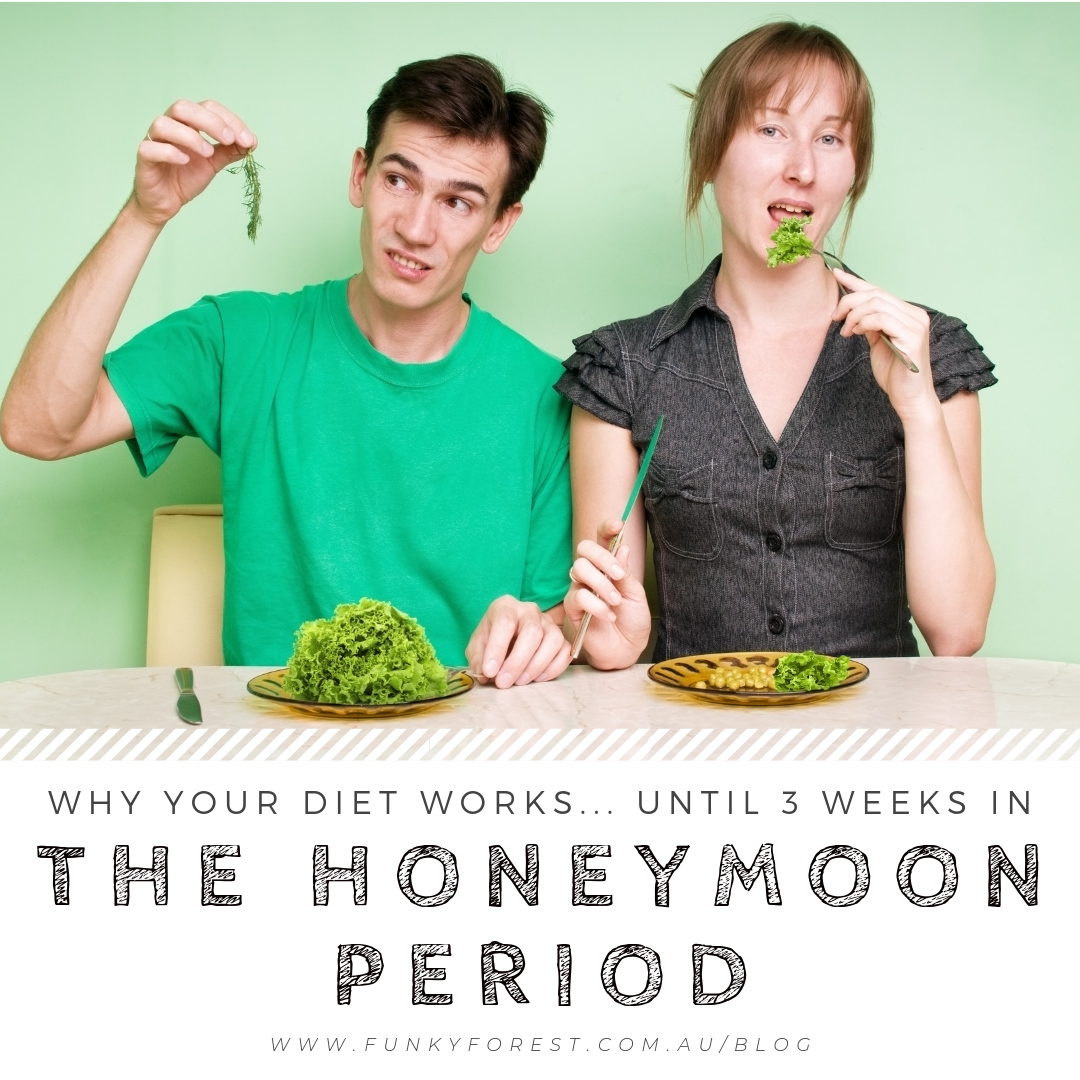"Keto is the best thing I've ever done. After 2 weeks of low-carb I have SO much energy!!"
"Why didn't I try intermittent fasting sooner? I've lost x kg AND need LESS sleep!"
"I've quit sugar and my skin is SO clear."
"Since going raw vegan my periods have stopped, but I've heard that's a sign my body is getting cleaner." (This one's the absolute worst).
Newbies to diets (yes, these are all wellness DIETS, not healthy, sustainable "lifestyle changes") fill online forums with tales of renewed health, regained vitality, happiness... and of course, weight loss. It's enough to make any unsatisfied online wellness trawler jump on board the next media-sensationalised dietary fad.
In fact maybe YOU are on day 7 of your juice cleanse / bulletproof coffee experiment / I Quit Sugar challenge, and you're feeling so good you've decided to become a health coach and "detox the world".
But friend, you need to understand that what you are experiencing is the dietary equivalent of The Honeymoon Period. You feel great and you truly believe that you've found the fountain of eternal youth and vitality.
WHY YOU FEEL GREAT ON YOUR DIET... UNTIL 3 WEEKS IN
You are hopped up on your stress hormones, and it is a short lived high.
Initially, when your body detects dietary restriction (be it inadequate calories, fat, or carbs), your body will release the stress hormones cortisol and adrenaline.
You feel awesome as these hormones elicit their pain-relieving, anti-inflammatory, and energising effects. People report not getting sick, acne clearing up, and feeling "high". They attribute these observations to the diet.
But let's be clear about what's REALLY happening in your body.
Any time you restrict food (be it calories, carbohydrates, fats etc), you are placing a stressor on the body.
Whether it's intermittent fasting (the type that results in a calorie deficit), LCHF or any other version of a diet - including The Wellness Diet.
Adrenaline & cortisol: your emergency flares
These stress hormones elicit anti-inflammatory, immune-suppressive, appetite-suppressive, and pain-killing effects - which is why many people report to feel better in the early stages of a diet.
ADRENALINE
Because your body sees your diet as a perceived "famine", within a few days you become hopped up on adrenaline and noradrenaline, also known as the "fight or flight" hormones. You feel more energised, more alert, and your appetite is suppressed.
Much like a truck driver who is jacked up on amphetamines and can drive for 20 hours straight without stopping to eat or sleep.
Previously painful joints or old injuries are no longer troubling you, and people figure it's because they've completely cut out carbs or whatever. But this is because your body, in its stressed, starved state, thinks you need to fight or flee - so it sends out natural pain-killing substances (called endorphins) to allow you to get away from this immediate threat.
CORTISOL
You do some blood tests and you see your inflammatory markers have reduced thanks to the increased cortisol pumping around your body. You may even notice your asthma or frequent colds clear up for the same reason.
People may see their cholesterol levels drop at the beginning of a restrictive diet. This is because cortisol is made from the base molecule cholesterol, and as your body kicks into stress mode it needs to turn more of its cholesterol into cortisol to keep you alive long enough to find some damn food.
"But, I lost weight!"
Actually, your body has detected a food shortage and your primitive hormonal regulation system (the one that only cares about your survival and doesn't give a shit about your diet or your weight loss goals) is using any available sugars and fuels to hunt or go searching for some food.
Subsequently, blood levels of sugars and lipids go down quickly, especially once glycogen stores are all used up and are not being properly replenished.
After the Honeymoon ends
In a nutshell, those stress hormones eventually suppress the thyroid gland, causing metabolism to slow down. As a result, energy levels fall. Some people, especially women, may develop hypothyroidism.
Weight loss slows to a grinding halt, even if the restrictive eating continues. Hunger, previously suppressed by adrenaline, returns with a vengeance and can trigger bingeing, which triggers guilt.
Digestion can slow down and become deranged due to the overgrowth of bacteria in the now slow moving small intestine and reduction in microbiota (especially if you've restricted carbohydrates during your fast).
Finally, people may notice they've developed low libido, PMS, infertility and other hormonal problems that so often crop up with restrictive dieting. This is because the body has shunted so much of its cholesterol to cortisol production, that the production of other steroid hormones like pregnenolone, progesterone and DHEA (which also require cholesterol for their manufacture) decreases.
This is the stage at which many women come to see me about their seemingly non-sensical health problems. The Honeymoon Period is just one stage in The Wellness Diet Cycle, which I discuss in full here.
So if you're feeling like a failure because you've crashed after initially getting "good results" on your diet, it's not your fault.
It's the diet that has failed you, not you that has failed the diet.


































 RSS Feed
RSS Feed



